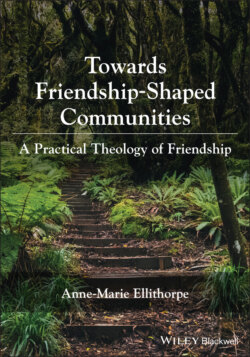Читать книгу Towards Friendship-Shaped Communities: A Practical Theology of Friendship - Anne-Marie Ellithorpe - Страница 25
Is Friendship Essential or Peripheral to Being Human?
ОглавлениеCurrently, friendship is treated as essential for children and optimal for the aged but given relatively little attention in the in-between years. It attracts minimal consideration within the church, academy, and workplace, or within the provision of social services. In religious contexts, friendship is rarely recognized as a virtue or personal discipline, integral to human flourishing. In the academy, friendship has been ignored or disdained as a focus for research. In the workplace, friendship is often regarded as a distraction. In some situations, friendship is recognized as unnecessary and even subversive. Within various environments, people relate to others primarily as clients, workers, consumers, and attendees rather than as friends.11 There seem to be few contexts where having deep friendships is regarded as the most essential thing for human beings.
Anthropologists have focused on kinship, neglecting the sometimes-overlapping concept of friendship. When friendship has been studied, the focus has been primarily on formal relationships with well-defined mutual obligations, including kinship, trade, and working relationships. Most of these studies have focused on male friendships and disregarded friendships between females.12 Nevertheless, in the early twentieth century the study of friendship emerged as a research field within anthropology, challenging the previous dominance of kinship studies.13 As anthropologists have begun to take up the topic of friendship in their work, they have identified friendship as a highly flexible social phenomenon and advocated for contextualized studies.14
Anthropologists who have considered friendship include Agnes Brandt and John Terrell. Brandt engaged in ethnographic fieldwork within Aotearoa New Zealand in order to “uncover the everyday construction of friendship in different socio-cultural contexts.”15 Her exploration of friendship worlds features within Chapter 2. Brandt observes that friendship has been regarded as a “social phenomenon of modernity.”16 This is somewhat ironic, given that contemporary theories of friendship are typically informed by Western-European traditions of thought, beginning with the writings of ancient Greeks and Romans. Furthermore, John Terrell’s observations suggest otherwise.
In A Talent for Friendship, Terrell begins by asking “What does it mean to be human?”17 He considers “what are most of us capable of doing?” rather than “what does everyone everywhere do?”18 Terrell did not specifically set out to research friendship. Nevertheless, his research has convinced him that the human capacity to make friends even with strangers is a defining characteristic of our species, marking us apart from (most) other species on earth.19
Terrell discovered that in places near and far along the Sepik coast of Papua New Guinea, there is a longstanding tradition of inheriting friends, generation after generation.20 The custom of inheriting friendships with families in other communities contributes significantly to the maintenance of social and cultural stability in one of the more environmentally challenging places in the world. Terrell’s observation that this practice helped sustain a way of life prompted him and his co-researcher to take a much closer look at what it means to be a friend.
Terrell observes an interplay between questioning conventional wisdom about friendship and contesting conventional wisdom about human nature.21 His observations and assertions are in stark contrast with the perception that friendship is a social phenomenon of modernity. However, Terrell speaks somewhat disparagingly of “ghost ideas” about human nature inherited from an Enlightenment-era reading of the book of Genesis.22 He asserts that the basic unit of human society is the individual and her social relationships with others, rather than the individual (and perhaps a helpmate).23 Is Terrell correct that friendship is innate to what it means to be human? Further, is he correct in considering this to be counter to the creation accounts of Genesis? Is this an area in which the Christian tradition needs correction? These are questions to which we will return in Chapter 6.
